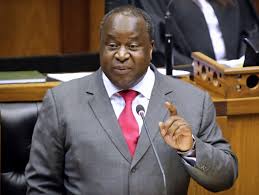South Africa’s Finance Minister Tito Mboweni ruled out an International Monetary Fund structural adjustment programme on Tuesday but said the COVID-19 pandemic would cause a deep recession and stretch weak public finances. Mboweni’s comments came after the central bank unexpectedly cut its main lending rate by 100 basis points to 4.25%, another step to try to limit the economic fallout from the coronavirus. Africa’s most industrialised nation was already in recession before it recorded its first coronavirus case in March. Investors are growing increasingly anxious about how the government will fund a gaping budget deficit while time it’s also making critical healthcare interventions. The country has the most confirmed coronavirus cases on the continent, at 2,415.
Addressing reporters on a conference call, Mboweni said cabinet ministers would discuss more economic interventions on Wednesday.
On the possibility of IMF funding he said: “We are not looking for budget support. We would be looking for the COVID-19-specific packages that we can access, and we are talking to them about that. We are looking at programmes which would not be accompanied by any structural adjustment programme,” he said. “We know what to do, we know what our structural reform programme is.”
Asking multilateral institutions, especially the IMF, for cash is deeply unpopular with a faction in the governing African National Congress and trade unions the party uses to rally support before elections. The ANC and two allies warned Mboweni earlier this month against seeking IMF assistance.
Mboweni said the government would revise its fiscal framework given the effects of COVID-19 but wouldn’t say when an “emergency budget” might happen. “The budget revisions are happening almost every day, … at some stage very soon we will have to make a consolidated budget statement,” he said. A copy of the minister’s speaking notes circulated by the National Treasury said elements to the government’s fiscal response included re-prioritising some expenditure towards healthcare, a plan to stabilise debt and shutting down South African Airways.
The airline is under a form of bankruptcy protection and depends on government bailouts for its survival. Mboweni declined to elaborate. Ramaphosa’s government has been praised for imposing restrictions on movement before any coronavirus deaths had been recorded. But attention is now turning to the probable economic consequences. Central bank governor Lesetja Kganyago told a news conference on Tuesday that the bank’s decision to cut rates was unanimous, after Ramaphosa extended a 21-day lockdown for a further two weeks on Thursday.
“Both the supply and demand effects of this extension reduce growth in the shorter term as businesses stay shut for longer and households with incomes spend less,” Kganyago said. “This will likely also increase job losses.” The central bank now expects gross domestic product to contract 6.1% in 2020. The rand turned weaker after the central bank rate cut and its bleak assessment of the economy’s prospects, trading down around 1.7% at 18.3650 to the U.S. dollar at 1330 GMT.
Mboweni said the government had not decided whether to introduce a basic income grant but that it had to be considered. He added that no agreement had been reached on pay increases for public-sector employees due to take effect this month.
Reuters

